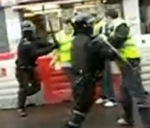
A protest against an event at Belfast City Hall to mark British Armed Forces Day was prevented from entering the city centre on Saturday by scores of riot police.
There was a very heavy Crown force presence in west Belfast in advance of the protest, which was organised by republican pressure group Eirigi.
Several hundred Eirigi supporters had gathered at Conway Mill on the Falls Road for the short five-minute walk into the centre of Belfast.
However, around 20 police Land Rovers with officers dressed in riot uniforms moved in to stop the crowd gaining access to the city hall, where a Union Jack flag was to be raised to honour British troops.
At one point there was a heated exchange between eirigi representative Breandan Mac Cionnaith and police.
A senior PSNI man claimed the protest was being blocked under public order legislation. It was claimed that because the group stepped onto the road their protest became an “illegal parade”.
“As dozens of masked paramilitary police decamped from armoured jeeps onto a Belfast street it could have been a scene from 1969, 1979 or 1989. But it wasn’t. Instead it was June 27th 2009 - the day of Britain’s inaugural ‘Armed Forces Day’,” an eirigi spokesperson said.
“If proof was ever needed of the unchanged nature of both British policing in Ireland and the wider occupation, it was provided in Belfast today. As one arm of Britain’s occupation forces were ‘celebrated’ with the flying of the ‘Armed Forces Day’ flag above City Hall, another arm of those same occupation forces were busy suppressing the right to peaceful protest.
“While republicans are all too used to the PSNI blocking the routes of ‘illegal’ marches, today the PSNI went a step further and prevented eirigi activists and supporters from even reaching the assembly point for a static picket.
“Those walking on the footpath found their path blocked by baton-yielding paramilitaries clad from head to foot in body armour. Such pre-emptive policing would sit comfortably in the police state of Orwell’s Nineteen Eighty-Four.”
After holding a brief impromptu protest at the bottom of the Falls Road, and amid concerns that the PSNI were intent on using violence, the protesters dispersed peacefully.
As part of the protest, the names of those killed as a result of British state violence was read to the listening crowd by Marie Drumm, whose mother Maire was murdered by unionist death squads, and eirigi’s Sean Mac Bradaigh.
Mr Mac Cionnaith said Saturday’s events showed that Belfast was “still a cold house for republicans”.
“All the talk of change in recent years has today been exposed as just that - talk and nothing more than empty, hollow talk. Belfast city centre remains a no-go zone for republicans - unless, of course, those republicans are wiling to ask the British state for permission to enter their own city.
“In light of the potential threat to the safety of those attending the picket we decided that it would be best for people from the west of the city to walk together to City Hall. And this is what we did only to find the footpath blocked by the PSNI riot squad. When we moved to the footpath on the other side of the road the PSNI moved ahead of us to block it also.
“Despite the spin of the PSNI there was no attempt made by eirigi to march to City Hall. What we witnessed today was the actions of a police state where protest and dissent are met with brute force.”
Mr O Cionnaith committed eirigi to opposing ‘Armed Forces Day’ in the future.
“Today was the first so-called armed forces day. By our protest here today eirigi has ensured that it did not pass unopposed. In the years to come we will build on today’s protest and ensure that June 27th becomes a date of protest - not a date of celebration.”
![[Irish Republican News]](https://republican-news.org/graphics/title_gifs/rn.gif)
![[Irish Republican News]](https://republican-news.org/graphics/title_gifs/harp.gif)

